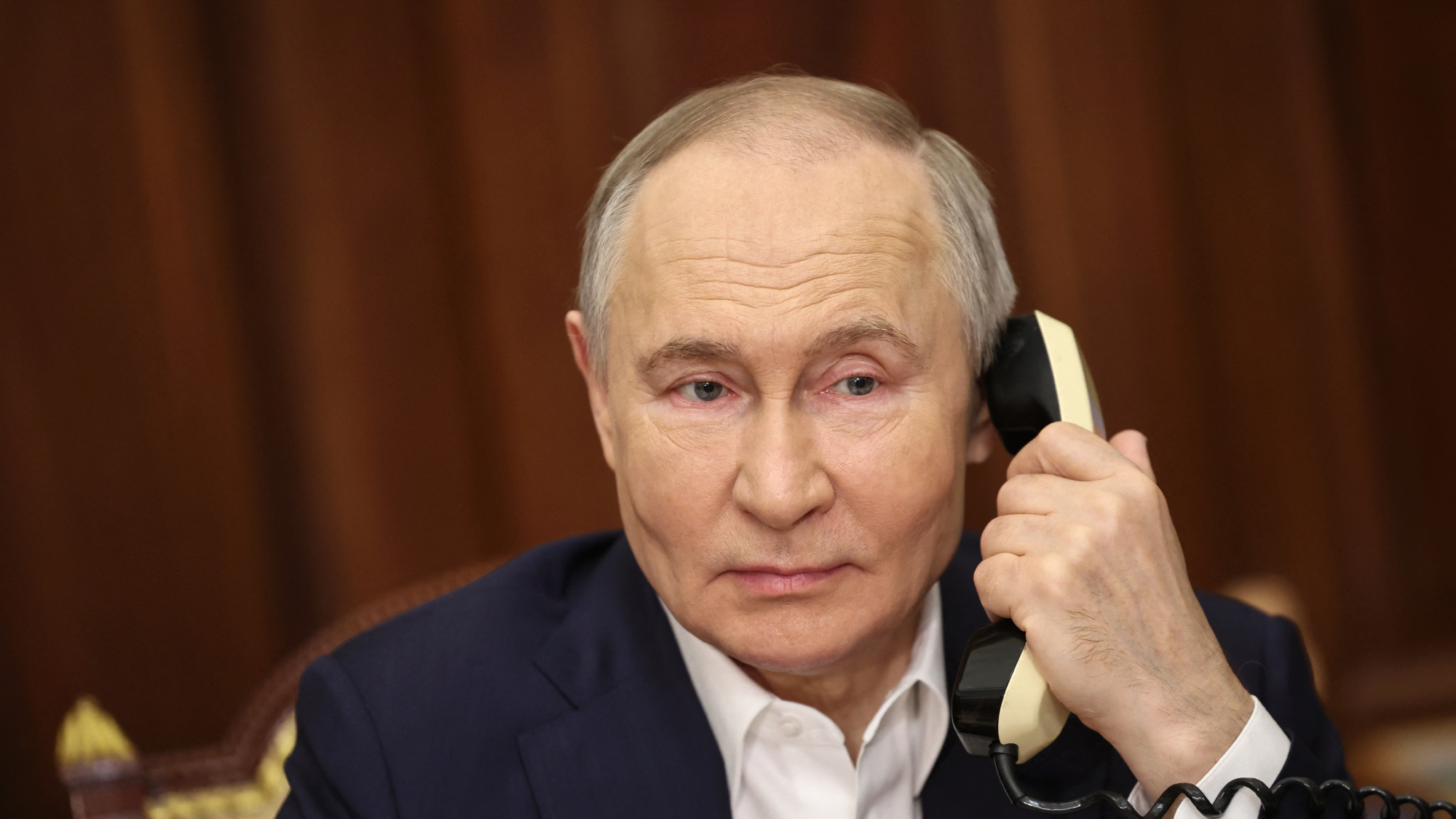Trump says Putin vowed retaliation for Kyiv strike
The Russian president intends to respond to Ukraine's weekend drone strikes on Moscow's warplanes


A free daily email with the biggest news stories of the day – and the best features from TheWeek.com
You are now subscribed
Your newsletter sign-up was successful
What happened
President Donald Trump said he and Russian President Vladimir Putin had a "good" 75-minute phone conversation Wednesday, "but not a conversation that will lead to immediate peace." Putin said, "very strongly, that he will have to respond" to Ukraine's weekend drone strikes on Moscow's most prized warplanes deep inside Russia, Trump recounted on social media.
Who said what
Trump's recap of the call did not say "how he reacted to Putin's promise" of retaliation, The Associated Press said, and it "showed none of the frustration" Trump has expressed in recent weeks over Putin's "prolonging of the war." Kremlin aide Yuri Ushakov did not mention Putin's retribution vow in Moscow's readout, but said the leaders discussed the drone strike "at some length." In Russia, CNN said, pro-Kremlin pundits and bloggers are "seething with calls for retribution, even nuclear retaliation."
Ukrainian President Volodymyr Zelenskyy said Wednesday night that none of the phone calls with Putin "have brought a reliable peace," and "with every new strike, with every delay of diplomacy, Russia is giving the finger to the entire world." The powerful "share responsibility" with Putin if they don't stop him, he wrote on social media, "and if they want to stop him but cannot, then Putin will no longer see them as powerful."
The Week
Escape your echo chamber. Get the facts behind the news, plus analysis from multiple perspectives.

Sign up for The Week's Free Newsletters
From our morning news briefing to a weekly Good News Newsletter, get the best of The Week delivered directly to your inbox.
From our morning news briefing to a weekly Good News Newsletter, get the best of The Week delivered directly to your inbox.
What next?
U.S. officials assess that Ukraine's explosive drones hit 20 Russian strategic bombers and spy plans and destroyed 10, Reuters said, about "half the number" Zelenskyy claims but still a "highly significant" strike that could "drive Moscow to a far more severe negotiating position in the U.S.-brokered talks."
A free daily email with the biggest news stories of the day – and the best features from TheWeek.com
Rafi Schwartz has worked as a politics writer at The Week since 2022, where he covers elections, Congress and the White House. He was previously a contributing writer with Mic focusing largely on politics, a senior writer with Splinter News, a staff writer for Fusion's news lab, and the managing editor of Heeb Magazine, a Jewish life and culture publication. Rafi's work has appeared in Rolling Stone, GOOD and The Forward, among others.
-
 Local elections 2026: where are they and who is expected to win?
Local elections 2026: where are they and who is expected to win?The Explainer Labour is braced for heavy losses and U-turn on postponing some council elections hasn’t helped the party’s prospects
-
 6 of the world’s most accessible destinations
6 of the world’s most accessible destinationsThe Week Recommends Experience all of Berlin, Singapore and Sydney
-
 How the FCC’s ‘equal time’ rule works
How the FCC’s ‘equal time’ rule worksIn the Spotlight The law is at the heart of the Colbert-CBS conflict
-
 Will increasing tensions with Iran boil over into war?
Will increasing tensions with Iran boil over into war?Today’s Big Question President Donald Trump has recently been threatening the country
-
 Corruption: The spy sheikh and the president
Corruption: The spy sheikh and the presidentFeature Trump is at the center of another scandal
-
 Putin’s shadow war
Putin’s shadow warFeature The Kremlin is waging a campaign of sabotage and subversion against Ukraine’s allies in the West
-
 Rubio boosts Orbán ahead of Hungary election
Rubio boosts Orbán ahead of Hungary electionSpeed Read Far-right nationalist Prime Minister Viktor Orbán is facing a tough re-election fight after many years in power
-
 Alexei Navalny and Russia’s history of poisonings
Alexei Navalny and Russia’s history of poisoningsThe Explainer ‘Precise’ and ‘deniable’, the Kremlin’s use of poison to silence critics has become a ’geopolitical signature flourish’
-
 Key Bangladesh election returns old guard to power
Key Bangladesh election returns old guard to powerSpeed Read The Bangladesh Nationalist Party claimed a decisive victory
-
 Greenland’s capital becomes ground zero for the country’s diplomatic straits
Greenland’s capital becomes ground zero for the country’s diplomatic straitsIN THE SPOTLIGHT A flurry of new consular activity in Nuuk shows how important Greenland has become to Europeans’ anxiety about American imperialism
-
 What happens now that the US-Russia nuclear treaty is expiring?
What happens now that the US-Russia nuclear treaty is expiring?TODAY’S BIG QUESTION Weapons experts worry that the end of the New START treaty marks the beginning of a 21st-century atomic arms race
